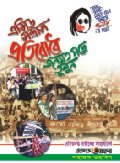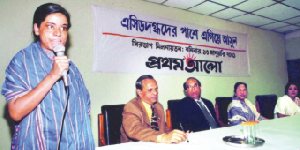Endeavour
Campaigning Against Crime
Prothom Alo's Battle
Against Acid Violence
Kajalie Shehreen Islam
 Salma,
an eighteen-year-old girl in Sylhet, was to be married today.
But on June 18, a man from a neighbouring village threw acid
on her face. Salma's crime: refusing his offer to have a romantic
relationship with him, and later, her family's rejection of
his marriage proposal. On June 19, after a 20-hour struggle
with death, Salma succumbed to her injuries. Salma,
an eighteen-year-old girl in Sylhet, was to be married today.
But on June 18, a man from a neighbouring village threw acid
on her face. Salma's crime: refusing his offer to have a romantic
relationship with him, and later, her family's rejection of
his marriage proposal. On June 19, after a 20-hour struggle
with death, Salma succumbed to her injuries.
Salma
is one of the many victims of acid violence that occur in
hundreds each year in Bangladesh. Some would say she is lucky
to have actually died, as opposed to having to deal with the
realities of surviving with such a handicap.
 Not
only must a woman brave a society that puts so much emphasis
on her appearance, but she must struggle to actually survive,
often with physical disabilities that may not allow her to
work to earn a living. She must battle for justice in a system
where the perpetrators are often the ones with the advantage.
She must have the will to keep living through all this, in
a society where heinous crimes like acid-throwing has become
a regular phenomenon. Not
only must a woman brave a society that puts so much emphasis
on her appearance, but she must struggle to actually survive,
often with physical disabilities that may not allow her to
work to earn a living. She must battle for justice in a system
where the perpetrators are often the ones with the advantage.
She must have the will to keep living through all this, in
a society where heinous crimes like acid-throwing has become
a regular phenomenon.
Bottles
of acid can be bought for as little as 15 or 20 Taka in this
country, and crimes are committed on the simplest of pretexts
-- from marital, family and land disputes to politics and
the refusal to pay dowry or respond favourably to romantic
advances or marriage proposals.
Four
hundred and fifty seven cases of acid violence were reported
in 2003, according to the Acid Survivors Foundation (ASF).
We read about them in the papers every other day. We are presented
with the facts: the names of the victims and the perpetrators,
the reason the crime took place, even the judgments pronounced
in cases that actually got that far. But what actually happens
to the victims of acid violence? How do they fight for justice?
How do they go on with their lives?
 Among
a handful of organisations like the ASF that have come forward
to help rehabilitate "acid victims", Prothom
Alo has been a ray of hope for many. From the beginning
of its publication, the newspaper has campaigned strongly
against acid violence, publishing numerous in-depth news stories
and features in order to build awareness and protest against
the crime as a step toward its elimination. Among
a handful of organisations like the ASF that have come forward
to help rehabilitate "acid victims", Prothom
Alo has been a ray of hope for many. From the beginning
of its publication, the newspaper has campaigned strongly
against acid violence, publishing numerous in-depth news stories
and features in order to build awareness and protest against
the crime as a step toward its elimination.
In
April 2000, to "combat severity of escalating acid violence
and promote treatment, provide legal aid and rehabilitation"
for victims, Prothom Alo created the Prothom
Alo Aid Fund (PAAF). The fund that was inaugurated with
the donation of a day's salary by all the employees of the
daily soon grew with the kind contributions of readers at
home and abroad as well as those of educational institutions,
clubs, student groups and even garment workers. Young people
have played a particularly strong role in the campaign, organising
various film, painting and photo exhibitions to raise funds
for the cause.
There
are various dimensions to the PAAF which aims at an overall
rehabilitation of victims of acid violence. Forty women, with
Tk. 500,000, have so far been provided medical assistance
and been substantially cured. The fund also provides legal
assistance to victims. Those who have been rendered physically
unfit to work are given a monthly allowance. Young people
who wish to study get stipends with which to complete their
education.
 Prothom
Alo correspondents personally talk to the victims in
order to understand their individual needs and demands, providing
some with a shop to run while others are given a cow to raise
or a trawler, to bring in a regular income. Some destitute
victims are given homesteads while others, who wish to be
educated, are admitted into school and given all the required
books and stationary. Prothom
Alo correspondents personally talk to the victims in
order to understand their individual needs and demands, providing
some with a shop to run while others are given a cow to raise
or a trawler, to bring in a regular income. Some destitute
victims are given homesteads while others, who wish to be
educated, are admitted into school and given all the required
books and stationary.
In
January 2001, Prothom Alo organised a discussion
session in which representatives of different organisations,
including government officials and intellectuals, participated.
Recommendations were forwarded to different ministries and
they proved effective as, according to one of them, the Ministry
of Commerce took steps to curb the availability of acid.
The daily also organised the "Bondhushobha" Cycle
Rally in which four youths travelled the country on bicycles
in order to increase awareness and raise public opinion against
acid violence. An exhibition and auction were also held in
which photographs were sold and cricket bats, signed by members
of the Bangladeshi, Sri Lankan and Australian teams, were
auctioned.
Through
the generous contributions of different organisations and
individuals, including banks, schools and universities, student
groups and business institutions, over 76 lakh Taka has been
raised in the campaign, of which over 38 lakh Taka has been
spent. A total of 58 women have been rehabilitated with the
fund money while 10 more are on the way. Besides this, the
fund has donated Tk. 100,000 to the Dhaka Medical College
Burn Unit.
 Acid-throwing
is a crime unheard of in most other countries in the world.
In ours, it has been increasing over the years. Seventy-seven
people were affected by acid violence between January and
April this year, up from 55 during the same period last year.
Most victims of acid violence are women, and most of the perpetrators
are men. Acid violence has become one more abominable way
to keep women repressed in a male-dominated society, for many
women will give in to their fears -- or else pay for not doing
so. Acid-throwing
is a crime unheard of in most other countries in the world.
In ours, it has been increasing over the years. Seventy-seven
people were affected by acid violence between January and
April this year, up from 55 during the same period last year.
Most victims of acid violence are women, and most of the perpetrators
are men. Acid violence has become one more abominable way
to keep women repressed in a male-dominated society, for many
women will give in to their fears -- or else pay for not doing
so.
The
importance of the media in today's world cannot be debated.
What influence each newspaper, magazine or television network
chooses to have is, however, up to them. Prothom Alo,
its readers and those who have come forward in the campaign
against acid violence have proved that, given dependable information
and the proper channels, there are people in our society who
are willing to help those in need, whether by spreading awareness
or by contributing financially to the rehabilitation of victims.
In a society where crime is rampant and the future seems bleak,
the goodwill of the common people is really all we have to
bank on.
Copyright
(R) thedailystar.net 2004
| 